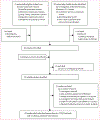Treatment correlates of successful outcomes in pulmonary multidrug-resistant tuberculosis: an individual patient data meta-analysis
- PMID: 30215381
- PMCID: PMC6463280
- DOI: 10.1016/S0140-6736(18)31644-1
Treatment correlates of successful outcomes in pulmonary multidrug-resistant tuberculosis: an individual patient data meta-analysis
Abstract
Background: Treatment outcomes for multidrug-resistant tuberculosis remain poor. We aimed to estimate the association of treatment success and death with the use of individual drugs, and the optimal number and duration of treatment with those drugs in patients with multidrug-resistant tuberculosis.
Methods: In this individual patient data meta-analysis, we searched MEDLINE, Embase, and the Cochrane Library to identify potentially eligible observational and experimental studies published between Jan 1, 2009, and April 30, 2016. We also searched reference lists from all systematic reviews of treatment of multidrug-resistant tuberculosis published since 2009. To be eligible, studies had to report original results, with end of treatment outcomes (treatment completion [success], failure, or relapse) in cohorts of at least 25 adults (aged >18 years). We used anonymised individual patient data from eligible studies, provided by study investigators, regarding clinical characteristics, treatment, and outcomes. Using propensity score-matched generalised mixed effects logistic, or linear regression, we calculated adjusted odds ratios and adjusted risk differences for success or death during treatment, for specific drugs currently used to treat multidrug-resistant tuberculosis, as well as the number of drugs used and treatment duration.
Findings: Of 12 030 patients from 25 countries in 50 studies, 7346 (61%) had treatment success, 1017 (8%) had failure or relapse, and 1729 (14%) died. Compared with failure or relapse, treatment success was positively associated with the use of linezolid (adjusted risk difference 0·15, 95% CI 0·11 to 0·18), levofloxacin (0·15, 0·13 to 0·18), carbapenems (0·14, 0·06 to 0·21), moxifloxacin (0·11, 0·08 to 0·14), bedaquiline (0·10, 0·05 to 0·14), and clofazimine (0·06, 0·01 to 0·10). There was a significant association between reduced mortality and use of linezolid (-0·20, -0·23 to -0·16), levofloxacin (-0·06, -0·09 to -0·04), moxifloxacin (-0·07, -0·10 to -0·04), or bedaquiline (-0·14, -0·19 to -0·10). Compared with regimens without any injectable drug, amikacin provided modest benefits, but kanamycin and capreomycin were associated with worse outcomes. The remaining drugs were associated with slight or no improvements in outcomes. Treatment outcomes were significantly worse for most drugs if they were used despite in-vitro resistance. The optimal number of effective drugs seemed to be five in the initial phase, and four in the continuation phase. In these adjusted analyses, heterogeneity, based on a simulated I2 method, was high for approximately half the estimates for specific drugs, although relatively low for number of drugs and durations analyses.
Interpretation: Although inferences are limited by the observational nature of these data, treatment outcomes were significantly better with use of linezolid, later generation fluoroquinolones, bedaquiline, clofazimine, and carbapenems for treatment of multidrug-resistant tuberculosis. These findings emphasise the need for trials to ascertain the optimal combination and duration of these drugs for treatment of this condition.
Funding: American Thoracic Society, Canadian Institutes of Health Research, US Centers for Disease Control and Prevention, European Respiratory Society, Infectious Diseases Society of America.
Copyright © 2018 Elsevier Ltd. All rights reserved.
Conflict of interest statement
Declaration of interests
All other authors declare no competing interests.
Comment in
-
Reducing harm in the treatment of multidrug-resistant tuberculosis.Lancet. 2018 Sep 8;392(10150):797-798. doi: 10.1016/S0140-6736(18)31670-2. Lancet. 2018. PMID: 30215367 No abstract available.
-
Better and safer treatment for multidrug-resistant tuberculosis.Lancet. 2018 Sep 8;392(10150):798-800. doi: 10.1016/S0140-6736(18)32149-4. Lancet. 2018. PMID: 30215368 No abstract available.
-
Multidrug-resistant tuberculosis.Lancet. 2019 Jul 27;394(10195):298-299. doi: 10.1016/S0140-6736(19)30691-9. Lancet. 2019. PMID: 31354136 No abstract available.
-
Multidrug-resistant tuberculosis.Lancet. 2019 Jul 27;394(10195):298. doi: 10.1016/S0140-6736(19)30696-8. Lancet. 2019. PMID: 31354137 No abstract available.
-
Multidrug-resistant tuberculosis.Lancet. 2019 Jul 27;394(10195):299. doi: 10.1016/S0140-6736(19)30046-7. Lancet. 2019. PMID: 31354138 No abstract available.
References
-
- WHO. Global tuberculosis report 2017 Geneva: World Health Organization, 2017.
-
- WHO. Guidelines for the programmatic management of drug-resistant tuberculosis Geneva: World Health Organization, 2011. - PubMed
-
- WHO. WHO treatment guidelines for drug-resistant tuberculosis, 2016 update Geneva: World Health Organization, 2016. - PubMed
-
- Ahuja SD, Ashkin D, Avendano M, et al., and the Collaborative Group for Meta-Analysis of Individual Patient Data in MDR-TB. Multidrug resistant pulmonary tuberculosis treatment regimens and patient outcomes: an individual patient data meta-analysis of 9,153 patients. PLoS Med 2012; 9: e1001300. - PMC - PubMed
-
- Diacon AH, Pym A, Grobusch MP, et al., and the TMC207-C208 Study Group. Multidrug-resistant tuberculosis and culture conversion with bedaquiline. N Engl J Med 2014; 371: 723–32. - PubMed
Publication types
MeSH terms
Substances
Grants and funding
LinkOut - more resources
Full Text Sources
Other Literature Sources
Medical
Miscellaneous


